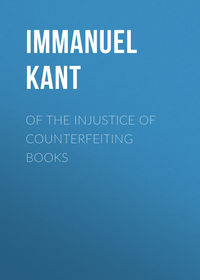Kitobni fayl sifatida yuklab bo'lmaydi, lekin bizning ilovamizda yoki veb-saytda onlayn o'qilishi mumkin.
Kitobni o'qish: «Of the Injustice of Counterfeiting Books»
Of The Injustice of Counterfeiting Books
Those who consider the publication of a book to be equivalent to the use of an author's property in the form of a copy (whether the possessor came by it as a manuscript from the author or as a transcript of it from an actual editor), and then, however, via the reservation of certain rights, whether of the author's or of the editor's, who is appointed by the author, want to limit the use of the book only to this, that is, want to impose the rule that it is not permitted to counterfeit the book, cannot, based upon the rationale of this aforementioned consideration, attain this anti-counterfeiting objective. For the author's property in his thoughts or sentiments (even if it were not granted that the concept of such thought or sentiment property has legal merit according to external laws) would remain to him regardless of whether or not that property was used or represented in the form of a counterfeit; and, since an express legal consent given by the purchaser of a book to such a limitation of their property would not likely be granted,1 how much less would a merely presumed consent suffice to determine the purchaser's obligation?
I believe, however, that I am justified to consider the publication of a book to be not the trading of a good [in the form of a book] in the trader's own name, but as the transacting of business in the name of another, namely, the author. [By considering the act of publication to be such a transaction], I am able to represent easily and distinctly the wrongfulness of counterfeiting books. My argument, which also proves the editor's right, is contained in a ratiocination; after which follows a second, wherein the counterfeiter's pretension shall be refuted.
I. Deduction of the Editor's Right against the Counterfeiter
Whoever transacts another's business in his name and yet against his will is obliged to give up to him, or to his attorney, all the profits that may arise therefrom, and to repair all the loss which is thereby occasioned to either the one or the other.
Now the counterfeiter is he who transacts another's business (the author's) against the other's will. Therefore the counterfeiter is obliged to give up to the author or to his attorney (or the editor) [any profits from the transaction].
Proof of the Major
As the agent, who intrudes himself, acts in the name of another in a manner not permitted, he has no claim to the profit which arises from this business; but the author or editor in whose name he carries on the business, or another authorized controller of the work to whose charge the former has committed the work, possesses the right to appropriate this profit to himself, as the fruit of his property. Besides, as this agent injures the possessor's right by intermeddling, "nullo jure," in another's business, he must of necessity compensate for all damages sustained. This lies without a doubt in the elementary conceptions of natural right.
Proof of the Minor
The first point of the minor is: that the editor transacts the business of the author by the publication. Here, everything depends on the conception of a book, or of a writing in general, as a labour of the author's, and on the conception of the editor in general (be he an attorney or not). Whether a book be a commodity which the author, either through the author's own efforts or by means of another, can traffic with the public, and can therefore transfer the ownership rights of the book, either with or without reservation of certain rights; or whether the book is instead a mere use of his works, which the author can indeed concede to others, but never transfer the ownership rights of; Again: whether the editor transacts his business in his own name, or transacts another's business in the name of another?
